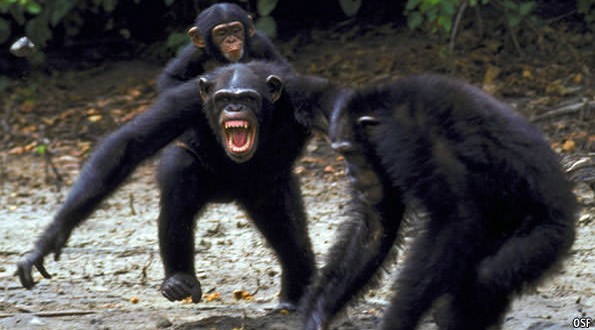Researchers have overturned the widely-held view of chimpanzees and revealed that they are, like humans, natural-born killers.
In the latest “Planet of the Apes” movie, human aggression spurs chimpanzees into battle. Some researchers have made similar claims for real apes: that feeding chimpanzees bananas, or clearing their forest homes, causes them to be unusually violent. A recent analysis of data from all long-term chimpanzee study sites in Africa has found that is not the case.
In the 1970s, Jane Goodall’s reports of chimpanzee violence caught the attention of a global audience. Since then, many people have compared chimpanzee intergroup aggression to primitive warfare and have argued that chimpanzee violence is an adaptive strategy that gives the perpetrators an edge. Others have argued that chimpanzees kill because their behavior has been changed by human activities, such as researchers feeding chimpanzees or the destruction of habitat as people clear forest for farms. A new study looking at data from chimpanzees and their close relatives, bonobos (also called pygmy chimpanzees), finds that human impact isn’t the culprit.
“Chimps and bonobos are the two living species most closely related to us of all the animals alive today; we share the most in common in terms of genetics and evolutionary history,” said University of Minnesota researcher Michael L. Wilson, lead author of a study in Nature to be published online Sept. 18. “Based on our results, it’s clear that lethal aggression is something that chimpanzees naturally do. We found that chimpanzees sometimes kill other chimpanzees, regardless of whether human impacts are high or low, whereas bonobos were not observed to kill, whatever the level of human impacts.”
Wilson worked with 29 co-authors at sites across Africa, to gather the necessary data. The study compiled over five decades of information from 18 chimpanzee (Pan troglodytes) communities and four bonobo (Pan paniscus) communities.
“People have long been interested in chimps as a way to better understand the evolution of human behavior,” Wilson said. While the new study answers one question, many more remain. “It’s still an open question whether this sort of violence is something that has happened continuously in human evolutionary history, or whether it arose independently in humans and chimps. Perhaps our common ancestor, which we believe lived 5 to 7 million years ago, also had high rates of violence, too.”
The study began as a response to a growing number of commentators claiming that chimpanzee violence was caused by human impacts.
“This is an important question to get right. If we are using chimpanzees as a model for understanding human violence, we need to know what really causes chimpanzees to be violent. And for the sake of chimpanzee conservation, if human activities are causing chimpanzees to kill each other, we need to address that.”
Wilson is an associate professor in the University of Minnesota’s College of Liberal Arts’ anthropology department and holds a joint appointment in the College of Biological Sciences. He studies the behavior and biology of chimpanzees, focusing on intergroup relations. Among other things, he was a consultant on the 2014 film “Dawn of the Planet of the Apes,” providing recordings of chimpanzees for use in the sound design.
Agencies/Canadajournal
 Canada Journal – News of the World Articles and videos to bring you the biggest Canadian news stories from across the country every day
Canada Journal – News of the World Articles and videos to bring you the biggest Canadian news stories from across the country every day



